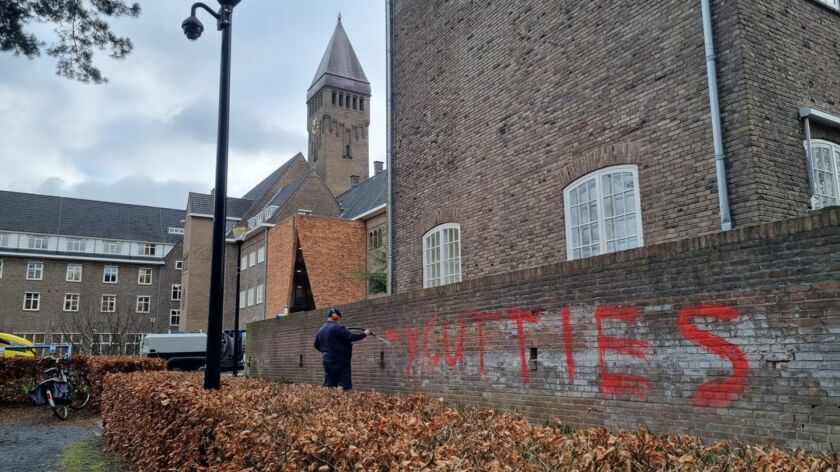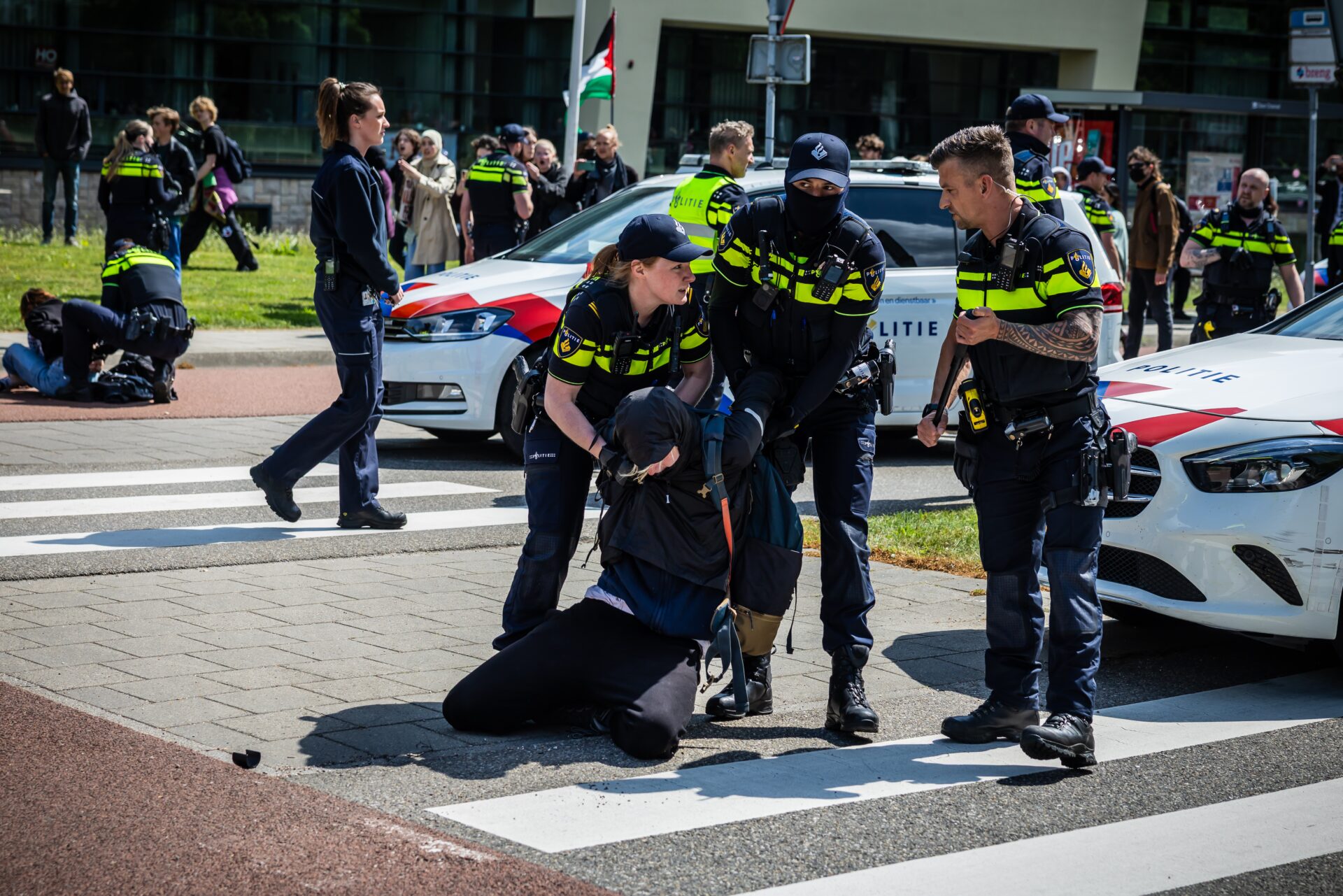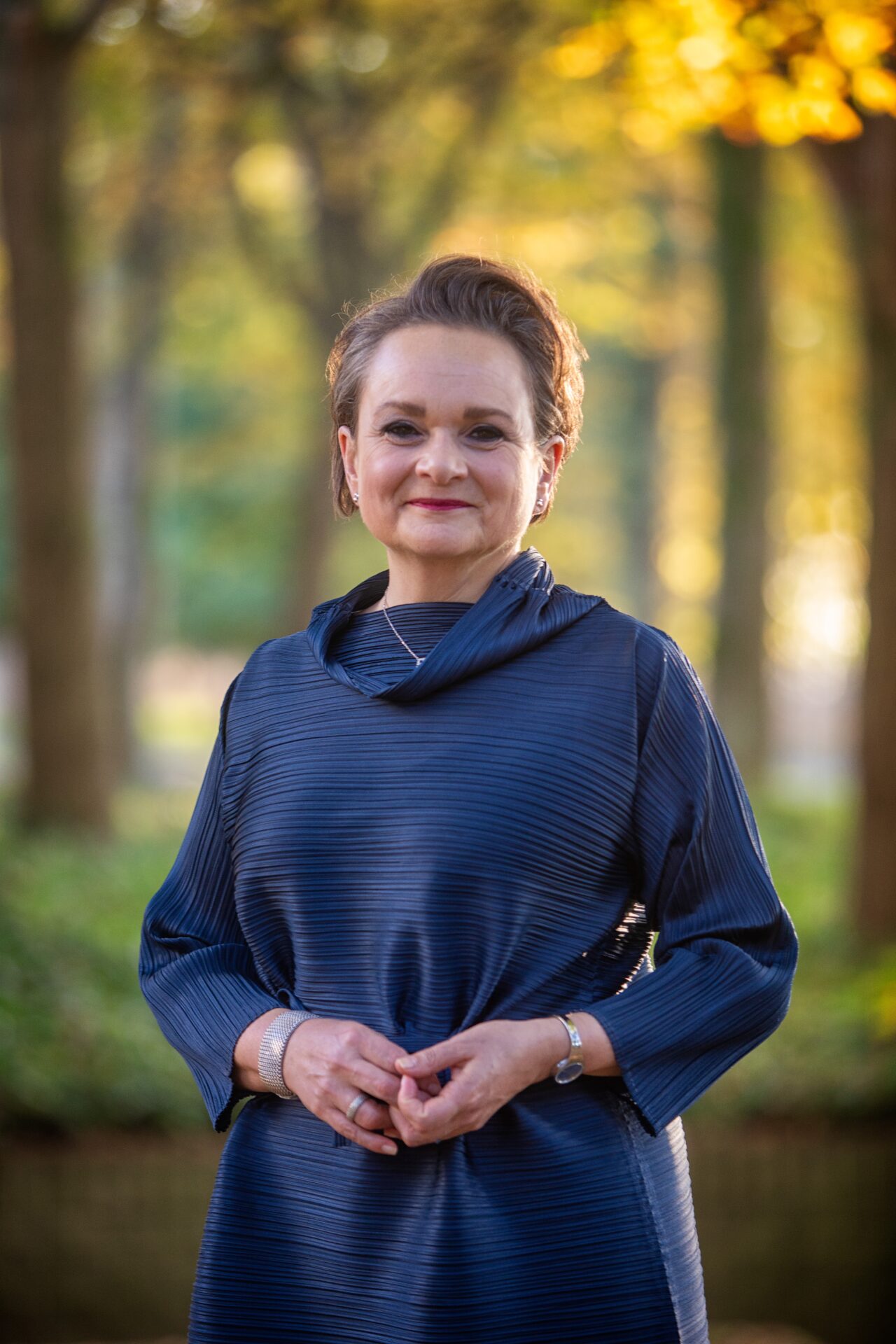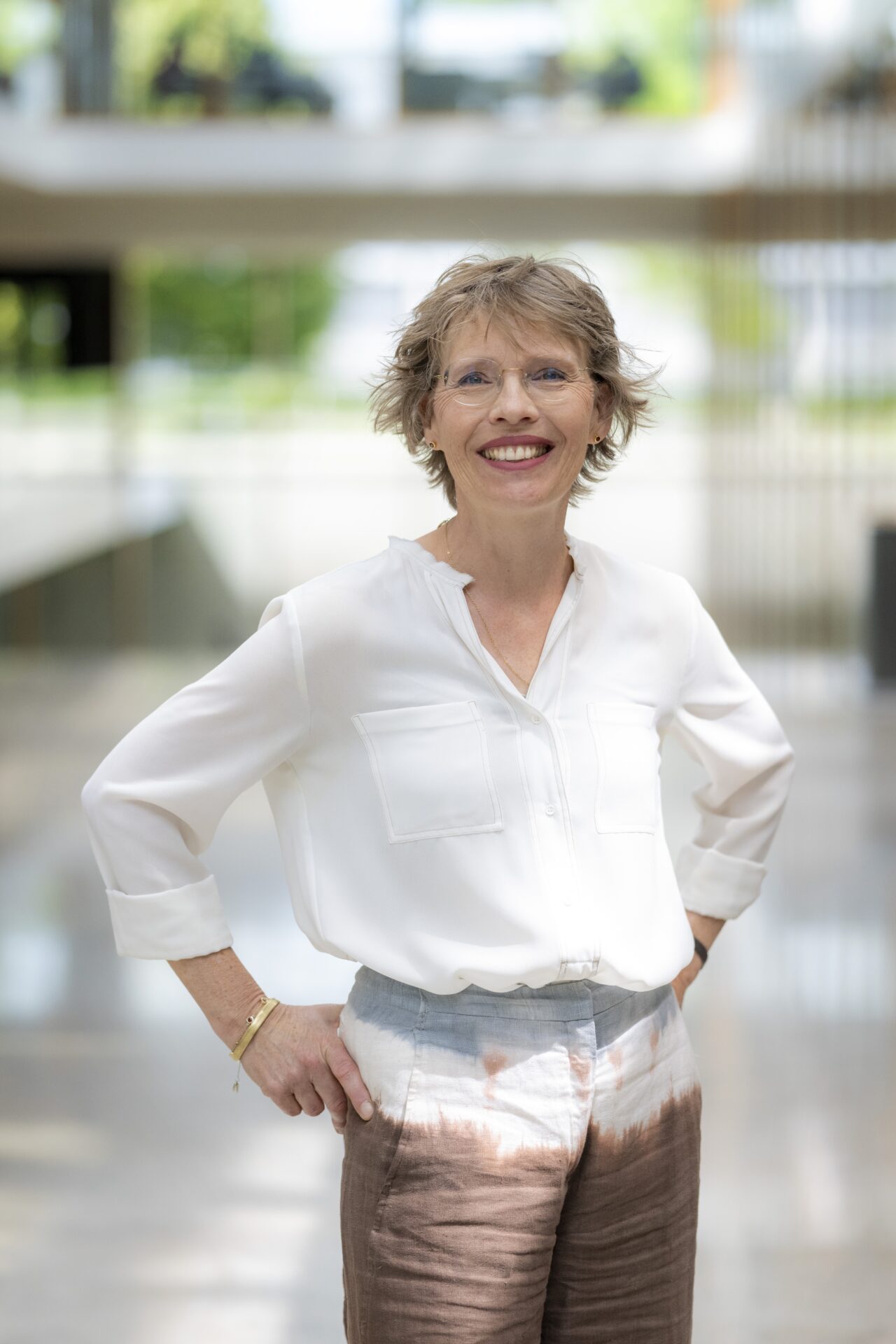‘As horrible as it is, we are not responsible for a student getting bitten in the leg’
-
 A cleaner is busy removing graffiti from the Berchmanianum. Photo: Vox
A cleaner is busy removing graffiti from the Berchmanianum. Photo: Vox
They hope that calm will return to the campus now that the university plans to suspend ties with two Israeli universities. But President of the Executive Board Alexandra van Huffelen and Rector José Sanders will not apologise for the police action following last week's demonstration.
‘Violence has no place on the Radboud University campus.’ President of the Executive Board Alexandra van Huffelen and Rector Magnificus José Sanders made no bones about it after a four-hour long and at times tense meeting with the participational bodies.
By violence, they mean the demonstration of last Wednesday. Both violence from protesters against university security guards, and from police against protesters. One student was injured in the leg after being bitten by a police dog, and another activist sustained a broken kneecap during the police action.
‘Once the participational bodies have presented their advice, we will take a final decision’
The activists demanded that the university adopt the advice of the International Partnerships Committee to end cooperation with Hebrew and Tel Aviv University. On Monday afternoon, the Executive Board announced that it did indeed intend to do so.
Will the partnerships with Hebrew University and Tel Aviv University be suspended with immediate effect? Or will they simply not be renewed, since they are both due to expire this summer?
Alexandra van Huffelen: ‘Once the participational bodies have presented their advice, we will take a final decision. Assuming we get a positive opinion, we will suspend the partnerships so that it becomes official. This means that they will also not be renewed, unless the universities meet our conditions. Incidentally, it is worth noting that these institutional partnerships are about student exchanges and at the moment there are no Radboud University students at either university – nor are we hosting any of their students.’
When will the proposed decision become final?
Van Huffelen: ‘That depends on when we receive the advice from the participational bodies, and on its content.’
Is there any chance that the proposed decision could still be amended? At the meeting, the participational bodies indicated that the proposed decision does not yet go far enough.
Van Huffelen: ‘I find it difficult to answer an if-then question. We need to look at their advice first. We want to do so carefully and thoroughly.’
Nijmegen Student Encampment regrets that the university is still involved in partnerships with Technion, the Weizmann Institute of Science, and Haifa University. Are the connections to those Israeli institutions also going to be investigated?
Van Huffelen: ‘We only looked at partnerships at institution level. When it comes to individual and bilateral collaborations, the decision lies with faculties and individual researchers. We are not saying people should not cooperate with any institution from Israel; this is also about the institution’s involvement in human rights violations. That is what we investigated for these two universities.’
José Sanders: ‘We have said from the start that we are not boycotting countries, but that it is about the institution you work with.’
Members of the participational bodies called for suspending individual collaborations between Radboud University researchers and the universities concerned. Is this something you are taking into consideration?
Sanders: ‘We want to leave individual employees the academic freedom to use their own judgment in these matters.’
Van Huffelen: ‘Suppose a doctor from Hebrew University calls for consultation with an expert from the medical faculty because a patient needs urgent help and the Nijmegen doctor is the specialist in that field. I could well imagine that Nijmegen doctor wanting to help.
‘I think that is a good example of an individual consideration that someone could make. We don’t want to obstruct that process. Of course, we would like our employees to consider the purpose of their collaborations. Plus, we do not want to stop our staff from working with individual scientists from Israeli institutions who speak out against their government’s policies.’
The comparison with Russia is often made. What is the policy on individual collaborations with Russian scientists?
Van Huffelen: ‘The policy of the Universities of the Netherlands (UNL) is that individual collaborations with Russian scientists are also still permitted.’
In retrospect, could this proposed decision not have been taken much earlier?
Sanders: ‘We have said from the onset that we want to be careful and thorough in making these decisions. Several universities that are struggling with this are currently working on figuring it out for themselves. Apparently, this is a time-consuming process. We started by appointing quartermasters. We then set up a committee so that we will be able to assess future collaborations (MoUs, eds.) with other partners. It takes time to formulate the values, formulate the terms of reference, set up a committee, draft an assessment framework, launch a participation process… We sometimes spent half our working week on it. If you want to do this carefully and thoroughly, it takes time.’
‘If you want to do this carefully and thoroughly, it takes time’
Van Huffelen: ‘If everyone agreed on this issue and the committee was done in three weeks, the situation would have been different. In our decision, we must also answer to our partners and to ourselves. So it could not have gone much faster.’
Sanders: ‘But the fact that it was not good enough or fast enough for many people is obvious and clearly palpable.’
You entered into talks with administrators from Tel Aviv and Hebrew University. What came out of these conversations?
Van Huffelen: ‘Those conversations were confidential. What we can share is that they did not give us any new insights; we still look at the committee’s recommendation in the same way. And so we are following up on it.’
But multilateral partnerships will not be broken?
Van Huffelen: ‘They can be, but we are not saying that they must be. Such collaborations, for example Horizon 2020 projects, often involve dozens of partners. The faculties involved may reach their own decisions in this regard. They may discontinue collaborations or choose not to enter into new collaborations involving these two Israeli universities.’
Why is there an opening here to keep that cooperation going?
Van Huffelen: ‘Because these are multilateral collaborations in which Radboud University and the Israeli institutions are only some of the players. These are very large research projects.’
Sanders: ‘Bilateral partnerships only involve two signatures: ours and theirs. That is something else.’
So what are the economic and ethical consequences of leaving a multilateral collaboration of the kind referred to in the proposed decision?
Sanders: ‘Unilaterally stepping out of such a partnership could lead to a breach of contract with all institutions involved, with potentially incalculable consequences for research, reputation, and finances.
‘The ethical implications concern academic freedom. You can imagine that there are fields in which you work with many partners, and where that is the only way to conduct research with partners. We would be interfering very deeply with people’s academic freedom if we said that this was no longer allowed. People can make these decisions for themselves, as can faculties. Of course, you can talk to your supervisor or dean about it.’
Do you think that with this proposed decision, calm will return to the campus, and polarisation will decrease?
Sanders: ‘We sincerely hope so.’
How do you look back on the police action on campus last Wednesday, in which one of the protesters was bitten in the leg by a police dog?
Van Huffelen: ‘We look back with horror at all the violence and confrontations that have taken place, both within the Berchmanianum and with the police.’

Different stories are circulating about what happened on Wednesday. According to the protesters, security guards cracked down on the protesters; according to the security guards, one of them was bitten in the hand, while others were scratched, punched, grabbed, and hurt on purpose. Are you conducting an investigation into what happened?
Van Huffelen: ‘Yes, an evaluation is underway. We want to understand what happened because we want to make sure it doesn’t happen again. It is absolutely not OK for our security guards to be treated this way, which is why we have also filed a report, and we also think it is unacceptable for our students to be treated this way by the police.’
Do you feel responsible for police brutality against students?
Sanders: ‘Demonstrating is always allowed. The fact that the conversation between the President of the Executive Board and a protester could not continue because an activist covered their face in no way justifies what happened next: breaking into a building, attacking security guards. That is inadmissible. We stand for everyone’s safety, including that of security guards. That is why the police was called in.’
Unions in letter to the Executive Board: ‘As a rule, the police don’t belong on campus’
‘As unions, we were astonished by the deployment of police, the intensity of the intervention, and the use of force in recent student protests at Radboud University, in particular during the protest of 7 May.’ So begins a letter from the AOb, FNV and FBZ unions to the Executive Board, which VOX was able to read.
According to union representatives, Radboud University is increasingly quick to call in the police on campus, and the police are also increasingly quick to deploy heavy and violent measures. The letter refers to the deployment of a police dog, which landed a student in hospital. According to the letter writers, the ‘irresponsible deployment’ of police is symptomatic of a culture of fear unbeffiting of an academic institution.
The union representatives believe the university administration should publicly reflect on its own actions, and be held accountable for the regular deployment of police in protests and occupations. They also call on the Executive Board to protect academic freedom and to respect the right to demonstrate – also on its own campus.
Van Huffelen: ‘To begin with, all seemed to be going well. The protesters calmly left the building. It was only later that a confrontation with the police took place, which ended violently and left students with considerable wounds and physical damage.’
How do you plan to prevent this in the future?
Van Huffelen: ‘We would very much like to sit down with the parties involved and talk about how we can do this right. Some of the students and student union AKKU demand that we never call in the police again. We want that too, but then activists should also agree to not walk into a building they are not supposed to enter. And there should be no more vandalism or crackdown on security guards. I hope things will calm down in the coming weeks so we can start having that conversation.’
At the end of the UGV, a member of the University Student Council read out a letter that said that trust is very much under pressure.
Sanders: ‘We heard that loud and clear.’
The letter was read out because the Executive Board did not want to apologise for police brutality on campus. Why don’t you apologise?
Van Huffelen: ‘You can only apologise for something you are responsible for. As horrible as I find it, we are not responsible for this student being bitten in the leg. The only thing we can do – and we try to do it as little as possible – is request assistance from the police where necessary. We do not know why the police chose this form of police deployment. I do know what the result is and it looks gruesome.’
‘We want to know what happened and for this to be clarified’
‘We called in the police because of what the protesters were doing. And I am not asking them to first apologise to the security guards who were beaten, bitten, and scratched. I want us to sit down and talk about it first.’
Are you going to talk to the police about this?
Van Huffelen: ‘Absolutely. We will soon sit down with the police to talk about it. We want to know what happened and for this to be clarified.’
Sanders: ‘Our hearts go out to everyone affected by this horrible situation in which activists have been injured. I think it’s horrible.’
Van Huffelen: ‘We can argue with each other until we weigh an ounce, and it is terrible what is happening in the Middle East. But the bottom line is that violence should have no place on campus.’
Jewish and Israeli students: ‘This is gesture politics’
By suspending ties with Israeli universities, Radboud University is choosing gesture politics over academic freedom. So says Milos Boksan, acting as spokesman for a group of Jewish and Israeli students at Radboud University. According to the group, the university administration would rather yield to the demands of rioting students who use violence against staff than do the right thing for academic freedom.
According to these students, the Israeli universities concerned have actually publicly spoken out against Israel’s current government policy. ‘Tilburg University explicitly referred to Hebrew University as a critical force within Israeli society for this very reason, and they see this as a good reason to proceed with the collaboration for the time being.’
The above interview with Alexandra van Huffelen and José Sanders was conducted before the new pro-Palestinian encampment was set up behind the Huygens building.





